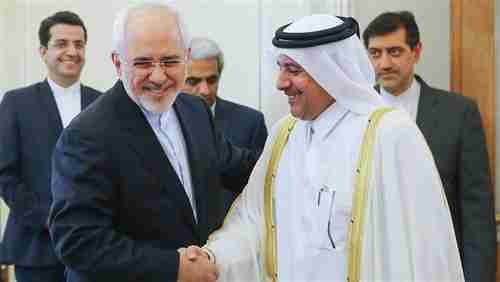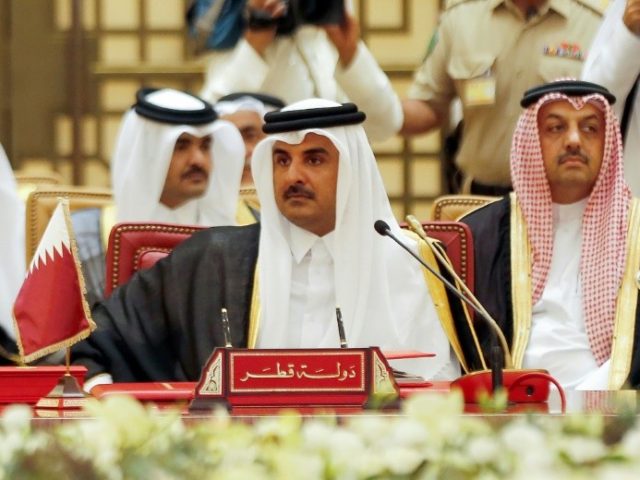This morning’s key headlines from GenerationalDynamics.com
- Donald Trump promises to solve the Gulf crisis ‘fairly easily’
- Qatar and Saudi Arabia have vitriolic exchange at Tuesday’s Arab League meeting
Donald Trump promises to solve the Gulf crisis ‘fairly easily’

Iran’s foreign minister Javad Zarif (L) meets with Qatar’s ambassador in Tehran on Monday. Close relations between Iran and Qatar are at the center of the Gulf crisis (Tehran Times)
On September 7, at a press conference at the White House with the emir of Kuwait, president Donald Trump promised to end the Gulf crisis that began on June 5 when four Arab countries – Saudi Arabia, United Arab Emirates (UAE), Bahrain and Egypt – imposed a land, sea and air blockade on Qatar. The reasons given were Qatar’s support for Iran, Qatar’s support for the Muslim Brotherhood (which the four countries consider to be a terrorist group), and Qatar’s aggressive use of al-Jazeera, especially the Arabic channel, to broadcast incitement to overthrow their governments.
Kuwait had been attempting to mediate the crisis, and at the press conference, he indicated that he would welcome help from the United States. Trump said:
While I do appreciate and respect the mediation, I would be willing to be the mediator. I was telling the Emir before that if I can help between UAE and Saudi Arabia, where I have a very great relationship — I spoke with the King yesterday, King Salman, who is a friend of mine, and we spoke on unrelated subjects, but we had a long conversation. If I can help mediate between Qatar and, in particular, the UAE and Saudi Arabia, I would be willing to do so. And I think you’d have a deal worked out very quickly.
I think it’s something that’s going to get solved fairly easily. Kuwait has been really the leader of getting it solved, and we appreciate that very much. But I do believe that we’ll solve it. If we don’t solve it, I will be a mediator right here in the White House. We’ll come together. Very quickly, I think, we’ll have something solved.
So Trump phoned the leaders of both Qatar and Saudi Arabia and asked these two leaders to speak to each other and resolve the issues. Early on Saturday, Qatari ruler Sheikh Tamim bin Hamad Al Thani and Saudi Crown Prince Mohammed bin Salman had a phone conversation. It was their first conversation since the crisis began, Unfortunately, no issues were resolved. Instead, they got into a public spat about who initiated the call, and who wanted it more than the other.
On Tuesday (yesterday), Trump called the leader of the United Arab Emirates (UAE), Sheikh Mohammed bin Zayed Al Nahyan, stressing the need to end terrorism. Tuesday’s call is Trump’s third to bin Zayed since the crisis began in June. Trump has also called Saudi King Salman five times, and the emir of Qatar two times. White House (7-Sep) and The National (UAE) and Bloomberg (9-Sep)
Related Articles
- With Arab world in chaos, Arab League summit displays lack of leadership and influence (30-Mar-2017)
- Mideast turmoil increases after Arab League suspends Syria (15-Nov-2011)
- Arab League meeting in Iraq split by acrimonious divisions (29-Mar-2012)
- Arab League holds annual meeting among bitter splits (26-Mar-2014)
Qatar and Saudi Arabia have vitriolic exchange at Tuesday’s Arab League meeting
If any proof was needed that the Gulf crisis will not be solved “fairly easily,” and in fact will not solved for a long time to come, it was provided at the Arab League meeting held in Cairo on Tuesday.
Qatar’s Minister of State for Foreign Affairs Sultan bin Saad al-Muraikhi immediately threw down the gauntlet by referring to Iran as an “honorable country,” and saying that ties had warmed since the blockade began.
The increasingly belligerent relations between Saudi Arabia and Iran, and the increasingly friendly relationship between Qatar and Iran, have become perhaps the biggest difference at the core of the acrimonious Saudi-Qatar relationship.
Relations between Iran and Saudi Arabia became explosive early in 2016 when Saudi Arabia executed 47 alleged terrorists – 46 Sunnis and one Shia, Mohammad Baqir Nimr al-Nimr. Iran and Shias were infuriated because the execution implied that Shia terrorism is equivalent to Sunni terrorism. Iranian mobs firebombed the Saudi embassy in Tehran, and attacked the consulate in Meshaad. Saudi Arabia and Iran broke diplomatic relations as a result. Other Saudi allies followed suit, including Qatar.
However, Qatar restored diplomatic relations with Iran last month. This is a move that was made since the June 5 blockade began and shows that the crisis is today less likely to be resolved than it was just a few weeks ago.
So at the Arab League meeting, when Qatar’s al-Muraikhi said that Iran was an “honorable country,” he was really rubbing Saudi Arabia’s nose in the disagreement.
In response, Ahmed al-Kattan, Saudi Arabia’s envoy to the Arab League, said:
Congratulations to Iran and soon, God willing, you will regret it.
If the brethren in Qatar think they may have a benefit in their rapprochement with Iran, I’d like to say that they have this evaluation wrong in every way. The Qataris will be held responsible for such a decision. …
The coming days will prove them wrong because we know that the Qatari people will never accept the Iranians to play a role in Qatar.
That sounds like a threat to me.
UAE’s Minister of State for Foreign Affairs Anwar Gargash said:
[The Gulf crisis continues] due to Qatar’s unwillingness for peace.
Their direction needs to change and we will continue our policies until Qatar changes its policies of aggression against the four boycotting countries, as long as Doha [Qatar] supports and funds terrorism and intervenes in the Middle East countries’ internal affairs.
So Qatar’s al-Muraikhi said that the crisis started when UAE-backed hackers hacked the Qatar News Agency, posting fake news. He added:
Then we saw this vicious media campaign against Qatar, waged by rabid dogs backed by some regimes. [UAE minister] Anwar [Gargash] forgot to mention that the four blockading countries tried a military action against my country in 1996.
Reuters and Al Jazeera (Qatar) and Arab News (Saudi Arabia)
Related Articles
- As Hajj approaches, Iran and Qatar remain in dispute with Saudi Arabia (27-Aug-2017)
- Egypt calls Qatar an ‘enemy state’ (30-Jun-2016)
- Gulf Arab states have major split over Egypt and Iran (06-Mar-2014)
KEYS: Generational Dynamics, Qatar, Saudi Arabia, United Arab Emirates, UAE, Bahrain, Egypt, Muslim Brotherhood, Iran, al-Jazeera, Kuwait, Sheikh Tamim bin Hamad Al Thani, Mohammed bin Salman, Sheikh Mohammed bin Zayed Al Nahyan, Sultan bin Saad al-Muraikhi, Mohammad Baqir Nimr al-Nimr, Ahmed al-Kattan, Anwar Gargash
Permanent web link to this article
Receive daily World View columns by e-mail

COMMENTS
Please let us know if you're having issues with commenting.